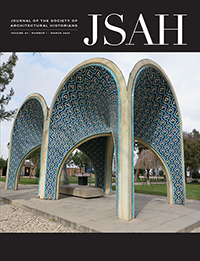-
Membership
Membership
Anyone with an interest in the history of the built environment is welcome to join the Society of Architectural Historians -
Conferences
Conferences
SAH Annual International Conferences bring members together for scholarly exchange and networking -
Publications
Publications
Through print and digital publications, SAH documents the history of the built environment and disseminates scholarshipLatest Issue:

-
Programs
Programs
SAH promotes meaningful engagement with the history of the built environment through its programsMember Programs
-
Jobs & Opportunities
Jobs & Opportunities
SAH provides resources, fellowships, and grants to help further your career and professional life -
Support
Support
We invite you to support the educational mission of SAH by making a gift, becoming a member, or volunteering -
About
About
SAH promotes the study, interpretation, and conservation of the built environment worldwide for the benefit of all
Program Date: Friday, February 18, 2022
The COVID-19 pandemic has re-centered health in our daily lives and reminded us that the places in which we live, work, play, and seek care all exert profound influences—intended and otherwise—on health outcomes. Yet, urban dwellers have long cohabitated with contagious illnesses, pollutants, and other environmental stressors, and, as a result, have attempted to create places that promote public and individual health in a holistic sense. These efforts can be read in built settings at all scales, from city plans and public parks to hospitals and homes. While there is much scholarly richness at the intersection of health and the built environment, this topic is somewhat marginalized in the field of urban and architectural history.
This panel showcases scholars from a range of disciplines whose work has productively pivoted with the application of a health-centered lens. Collectively, these scholars will demonstrate how using a public health lens can—and should—shed new light on neglected aspects of architectural history and practice by placing human beings (rather than buildings) in the center of research and foregrounding new areas of inquiry and opportunities for interdisciplinary collaboration. Such people- and health-centered partnerships and directives also have unique potential to foreground the inequities that have long accompanied and exacerbated the relationships between people, place, and health, and to better inform and work toward more just, equitable, and effective architectural interventions. Aiming at creating an inspiring setting, especially for junior researchers and to promote innovative research on intersections of health and architectural history, the organizers are planning to invite five panelists from various fields, including history, science history, architecture, and public health.
This panel is co-organized in collaboration with the Epidemic Urbanism Initiative. Founded in March 2020, the EUI has 1900+ members from more than 90 countries.
Speakers:
-
Louisa Iarocci, University of Washington
-
Richard J. Jackson, UCLA
-
Bill Leslie, The Johns Hopkins University
-
Elizabeth Mellyn, University of New Hampshire
-
Daniela Sandler, University of Minnesota
Moderators:
-
Caitlin DeClercq, Columbia University
-
Mohammad Gharipour, Morgan State University
Speakers

Louisa Iarocci is Associate Professor in the Department of Architecture at the University of Washington in Seattle where she teaches architectural history, theory and design. She is a licensed architect who has worked on healthcare, institutional and educational projects in the US and Canada. Her recent publications include an essay in the anthology, Epidemic Urbanism: How Contagious Diseases have shaped Global Cities, (Intellect, 2021) edited by Mohammad Gharipour and Caitlin DeClercq.

Richard Jackson is Professor Emeritus of Public Health at UCLA where he was Department Chair in Environmental Health Sciences. A pediatrician, he served with the California Health Department, including as the State Health Officer. For nine years he was director of the CDC’s National Center for Environmental Health. He is an elected member of the National Academy of Medicine. Jackson lectures on issues related to Climate Heating, Environment, and Health, and hosted the PBS series Designing Healthy Communities. He is an elected Honorary member of the American Institute of Architects and of the American Society of Landscape Architects.

Bill Leslie is Professor of the History of Science, Technology, and Medicine at The Johns Hopkins University. His scholarship has primarily focused on the Cold War, most recently with attention to the architecture of Cold War suburbs in the US and the USSR, government laboratories in Iran, India, and Pakistan, and satellite surveillance bases in Australia and Canada. His research on the architecture of healthcare includes a study of hospitals and medical education in Pakistan.

Elizabeth Mellyn is an Associate Professor of History at the University of New Hampshire where she teaches courses on early modern European history, the history of medicine, and the history of mental illness. Her publications include Mad Tuscans and their Families: A History of Mental Disorder in Early Modern Italy (University of Pennsylvania Press). She is currently co-editing the Renaissance volume in the Bloomsbury History of Madness and writing a history of Florence's first mental hospital.

Daniela Sandler is an associate professor at the School of Architecture at the University of Minnesota. Her work focuses on urban inequalities and grassroots urbanism. She is the author of Counterpreservation: Architectural Decay in Berlin since 1989 (Cornell University Press, 2016). Her chapter on the 1970s meningitis epidemic in Brazil (Epidemic Urbanism, ed. Caitlin DeClercq and Mohammad Gharipour, Intellect Books, 2021) is part of a larger project on epidemics and shared spaces in São Paulo.

Caitlin DeClercq is Assistant Director of Graduate Student Programs and Services at the Center for Teaching and Learning at Columbia University. Her work on the history and practice of healthy campus design has been included in edited volumes and journals such as Experiencing Architecture in the Nineteenth Century: Buildings and Society in the Modern Age (Bloomsbury, 2018) and Planning for Higher Education. She is the co-founder of Epidemic Urbanism Initiative.


